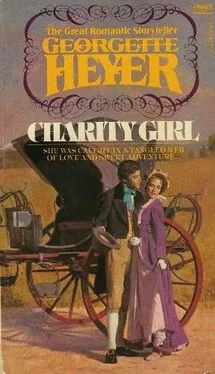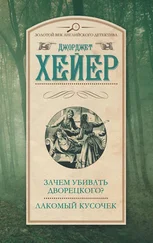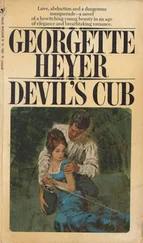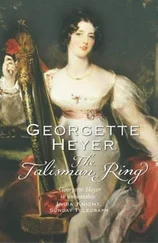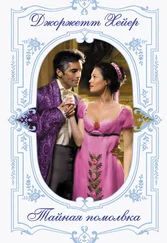Джорджетт Хейер - Charity Girl
Здесь есть возможность читать онлайн «Джорджетт Хейер - Charity Girl» весь текст электронной книги совершенно бесплатно (целиком полную версию без сокращений). В некоторых случаях можно слушать аудио, скачать через торрент в формате fb2 и присутствует краткое содержание. Год выпуска: 1970, Жанр: Исторические любовные романы, на английском языке. Описание произведения, (предисловие) а так же отзывы посетителей доступны на портале библиотеки ЛибКат.
- Название:Charity Girl
- Автор:
- Жанр:
- Год:1970
- ISBN:нет данных
- Рейтинг книги:4 / 5. Голосов: 1
-
Избранное:Добавить в избранное
- Отзывы:
-
Ваша оценка:
- 80
- 1
- 2
- 3
- 4
- 5
Charity Girl: краткое содержание, описание и аннотация
Предлагаем к чтению аннотацию, описание, краткое содержание или предисловие (зависит от того, что написал сам автор книги «Charity Girl»). Если вы не нашли необходимую информацию о книге — напишите в комментариях, мы постараемся отыскать её.
Charity Girl — читать онлайн бесплатно полную книгу (весь текст) целиком
Ниже представлен текст книги, разбитый по страницам. Система сохранения места последней прочитанной страницы, позволяет с удобством читать онлайн бесплатно книгу «Charity Girl», без необходимости каждый раз заново искать на чём Вы остановились. Поставьте закладку, и сможете в любой момент перейти на страницу, на которой закончили чтение.
Интервал:
Закладка:
Georgette Heyer
Charity Girl
Chapter 1
As far as it was possible for an elderly gentleman suffering from dyspepsia and a particularly violent attack of gout to take pleasure in anything but the alleviation of his various pains the Earl of Wroxton was enjoying himself. He was engaged on the agreeable task of delivering himself of a diatribe on the shortcomings of his heir. To the uninitiated his strictures must have seemed unjust, for Viscount Desford bore the appearance of a son of whom any father must have been proud. In addition to a goodlooking countenance, and a lithe, athletic figure, he had the easy manners which sprang as much from an innate amiability as from his breeding. He had also a considerable store of patience, and a sense of humour which showed itself in the smile which lurked in his eyes, and which was thought by a great many persons to be irresistible. His father was not of their number: when a victim of gout, he thought it exasperating.
The month was July, but the weather was so far from sultry that the Earl had caused a fire to be kindled in his library. On either side of the hearth he and his heir were seated, the Earl with one heavily bandaged foot on a stool, and his heir (having discreetly edged his chair away from the warmth of the smouldering logs) at his graceful ease opposite him. The Viscount was wearing the coat, the buckskin breeches, and the top boots which were the correct morning-attire for any gentleman sojourning in the country, but a certain elegance, deriving from the cut of his coat, and the arrangement of his neckcloth, gave his father an excuse for apostrophizing him as a damned dandy. To which he responded, in mild protest: “No, no, sir! The dandy-set would be shocked to hear you say so!”
“I collect,” said his father, glaring at him, “that you call yourself a Corinthian!”
“To own the truth, sir,” said the Viscount apologetically, “I don’t call myself anything!” He waited for a moment, watching with as much sympathy as amusement the champing of his parent’s jaws, and then said coaxingly: “Now, come, Papa! What have I done to earn such a trimming from you?”
“What have you done to earn praise from me?” instantly countered the Earl. “Nothing! You’re a skitter-brain, sir! A slibberslabber here-and-thereian, with no more thought for what you owe your name than some rubbishing commoner! A damned scattergood—and you’ve no need to remind me that you’re not dependent on me for the money you waste on your horses, and your betting, and your bits of muslin, for I’m well aware of it, and what I said at the time, and say now, and always shall say is that it was just like your great-aunt to leave her fortune to you, and exactly what might have been expected of such a shuttlehead as she was! As well have handed you a carte blanche to commit every sort of—of extravagant folly! But on that head,” said his lordship inaccurately, but with perfect sincerity, I shall say nothing! She was your mother’s aunt and that circumstance seals my lips.”
He paused, throwing a challenging glance at his heir, but the Viscount merely said, with becoming meekness: “Just so, Papa!”
“Had she stipulated that her fortune was to be used for the support of your wife and family I should have thought it a very proper bequest,” announced his lordship, adding, however: “Not that I was not at that time, and at this present, able and willing to increase your allowance to enable you to meet the added expenses consequent on your entry into the married state.”
He paused again, and the Viscount, feeling that some comment was expected, said politely that he was much obliged to him.
“Oh, no, you’re not!” said his lordship grimly. “And, what’s more, you won’t be until you provide me with a grandson, no matter how fast your great-aunt’s fortune burns in your pockets! Upon my word, a pretty set of children I have!” he said, suddenly enlarging his scope. “Not one of you cares a straw for the Family! At my age I might have expected to have had a score of grandchildren to gladden my last years! But have I? No! Not one!”
“In fact you have three,” replied the Viscount disconcertingly. “Not that it has ever seemed to me that they gladdened you precisely, but I do feel it to be only just to Griselda that her offspring should be mentioned!”
“Girls!” snapped the Earl, sweeping them aside with a contemptuous gesture. “I take no account of them! Besides, they’re Broxbourne brats! What I want is sons, Ashley! Carringtons, to succeed to our Name, and our Honours, and our Tradition!”
“But scarcely a score of them!” protested the Viscount. “One must be reasonable, sir, and even if I had obliged you by marrying when I was twenty, and my unfortunate wife had presented me with twins every year, you must still have been at least two short of your expectation—setting aside the probability that there would have been several girls amongst such a bevy of grandchildren.”
This attempt to win his parent out of his ill-humour might have succeeded (for the Earl was fond of the ridiculous) had not a sudden twinge in his afflicted foot caused him to wince, and to utter in a menacing voice: “Don’t be impertinent, sir! I would remind you that you—I thank God!—are not my only son!”
“No,” agreed the Viscount, with unruffled cordiality. “And while I can’t but feel that Simon is too young to be setting up his nursery I have great hopes that Horace may oblige you—when the Occupation ends, as, from all accounts, it will do in the not too far distant future—and he returns to us.”
“Horace!” uttered his lordship. “I may think myself fortunate if he doesn’t come home with some French hussy on his arm!”
“Oh, I don’t think that very likely!” said the Viscount. “He is not at all partial to foreigners, sir, and quite as mindful of what is due to the Family as you are.”
“I shan’t be alive to see it,” said the Earl, seeking refuge in decrepitude, but slightly damaging his effect by adding an acrimonious rider: “Much any of you will care!”
The Viscount laughed, but with a good deal of affection. “No, no, Papa!” he said. “Don’t try to pitch the fork to me! I haven’t been on the town for nine years—and intimately acquainted with you for twenty-nine years!—without learning when a man is trying to come crab over me! Good God, sir, you’re all skin and whipcord—saving only a tendency to gout, which you may easily overcome by not drinking the best part of two bottles of port at a sitting and you’ll hold for a long trig! Long enough, I’ve little doubt, to rake down a son of mine as you’re raking me down today!”
The Earl could not help being gratified to know that his heir considered him to be in very good condition, but he thought it proper to say austerely that he neither understood nor approved of the cant expressions so deplorably in use amongst the young men of the day. He toyed for a moment with the impulse to inform the Viscount, in forthright terms, that when he desired his opinion of his drinking habits he would ask him for it, but discarded this notion, because he knew that no dependence could be placed on Ashley’s receiving a snub in filial silence, and he had no wish to embark on an argument in which he stood on very unreliable ground. Instead, he said: “A son of yours? I want no base-born brats, I thank you, Desford—though I daresay you have a score—any number of them!” he amended hastily.
“Not to my knowledge, sir,” said the Viscount.
“I’m glad to hear it! But if you had agreed to the marriage I planned for you a son of yours might have been sitting on my knee at this moment!”
Читать дальшеИнтервал:
Закладка:
Похожие книги на «Charity Girl»
Представляем Вашему вниманию похожие книги на «Charity Girl» списком для выбора. Мы отобрали схожую по названию и смыслу литературу в надежде предоставить читателям больше вариантов отыскать новые, интересные, ещё непрочитанные произведения.
Обсуждение, отзывы о книге «Charity Girl» и просто собственные мнения читателей. Оставьте ваши комментарии, напишите, что Вы думаете о произведении, его смысле или главных героях. Укажите что конкретно понравилось, а что нет, и почему Вы так считаете.
